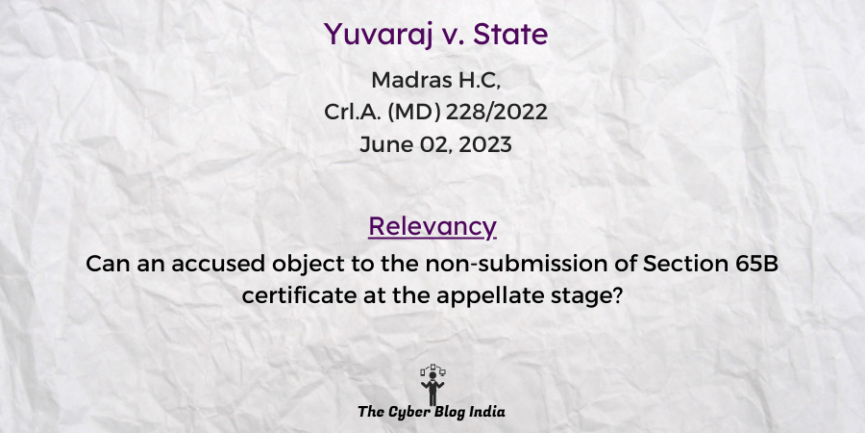Yuvaraj v. State

Yuvaraj v. State
(2023) 2 MWN (Cri) 161
In the High Court of Madras
Crl.A. (MD) 228/2022
Before Justice M.S. Ramesh and Justice N.A. Venkatesh
Decided on June 02, 2023
Relevancy of the Case: Can an accused object to the non-submission of Section 65B certificate at the appellate stage?
Statutes and Provisions Involved
- The Indian Penal Code, 1860 (Section 120B, 302)
- The Indian Evidence Act, 1862 (Section 65B)
- The Scheduled Castes and Scheduled Tribes (Prevention of Atrocities) Act, 1989 (Section 3)
Relevant Facts of the Case
- The deceased was seen with his collegemate at the Arthanareeswarar temple at Tiruchengode. Later, he was found dead on the railway track in Tamil Nadu’s Namakkal district.
- The police initially considered it to be a suicide case; however, the postmortem report claimed it to be a homicide case.
- The investigation revealed that it was a case of honour killing. The police found that the petitioner, a leader of the local dominant caste group, had killed the deceased.
- The Special Sessions Court in Madurai sentenced the first accused and 10 other accused to life imprisonment.
- In December 2022, the High Court took sou motu cognizance of the case, as one of the witnesses, the deceased’s collegemate, refused to identify herself in the CCTV footage presented as evidence.
Prominent Arguments by the Advocates
- The prosecution’s main contention was that the case was based on caste hatred. The prime accused formed an association in 2014. There, he had given a speech that the girls belonging to his community should not fall in love and marry in other communities. The prosecution argued that there was adequate circumstantial evidence, i.e., CCTV footage, mobile records and witnesses, and the accused’s confession (the admissible portion).
- The appellant’s (first accused’s) counsel argued that much of the digital evidence relied on by the prosecution was inadmissible. The CCTV footage relied on the last-seen theory, which was inadmissible as the prosecution had not attached Section 65B. Further, the prosecution could not establish the motive of the accused as the prosecution’s main witness turned hostile.
Opinion of the Bench
- The CCTV footage and photographs were admissible, as the accused brought up no objections regarding the Section 65B certificate during the original trial phase. This is too late to file such objections in the appellate stage.
- Further, the prosecution had marked the television interview and the call records with a section 65B certificate in the original trial phase. The defendant could not bring up such arguments regarding the insufficiency of the certificate in the appellate stage if it was not brought up in the original trial.
- Considering the above evidence to be admissible, the prosecution proved the last-seen theory. Further, the prosecution was able to establish the motive for the murder through the television interview. There is no insufficiency in the original judgment.
Final Decision
- The bench dismissed the appeal.
Adyasha Sahoo, an undergraduate student at the Institute of Law, Nirma University Ahmedabad, and Arnav Kaman, an undergraduate student at Rajiv Gandhi National University of Law, Punjab, prepared this case summary during their internship with The Cyber Blog India in January/February 2024.
